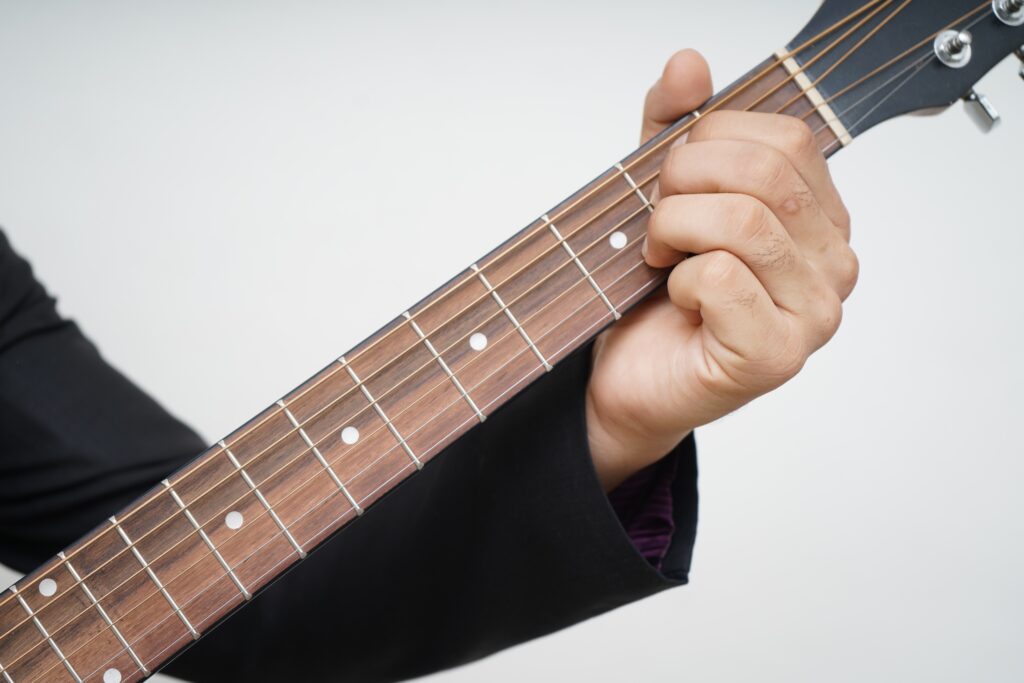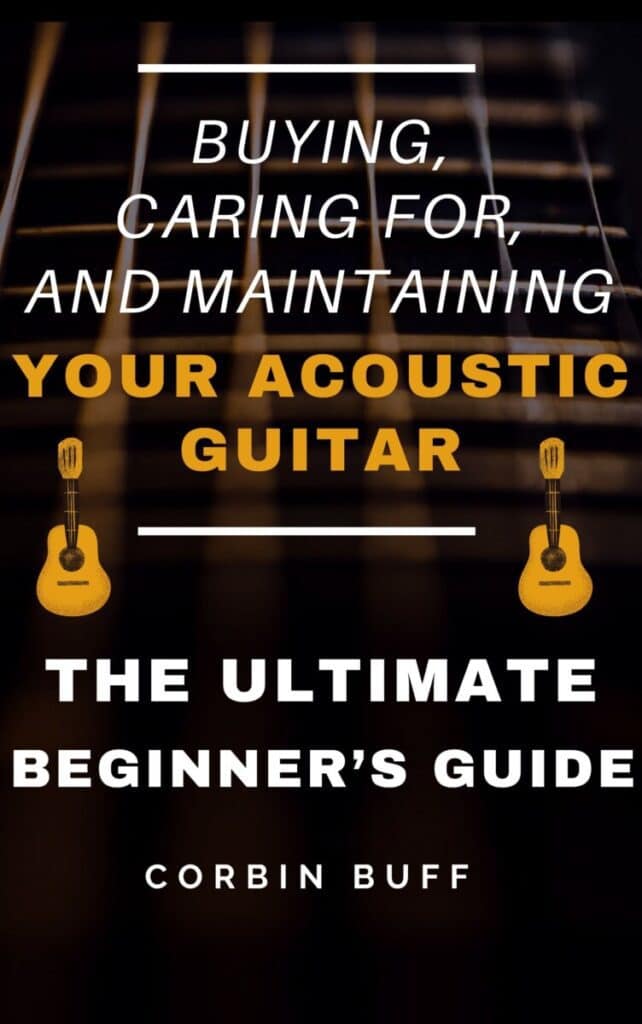
Any guitarist will tell you that it can be tough staying motivated while learning guitar through the years, and many people lose motivation to play guitar. That’s why I wanted to write a helpful post full of tips I’ve personally used to stay motivated while learning guitar and keep playing throughout the years.
I hope the tips below help you to keep your guitar motivation throughout your journey, so that you stick with the instrument. If you’re losing motivation on the guitar or know someone who is, share this with them so that we can all stay motivated and keep learning guitar for years to come!
1. Read a book
One of my biggest secrets for fueling my guitar motivation is reading books. These don’t have to be books on scales, music theory or guitar techniques, although that’s also fine if that interests you.
But personally, I really like to read books on my favorite bands or musicians who inspired me to start playing guitar in the first place. For me, this meant reading Bill Krutzman’s new Grateful Dead biography, reading Bob Dylan’s autobiographical books, and getting a book of all of Paul Simon’s lyrics.
Connecting with your favorite artists and bands through a book can really refresh your perspective on what the guitar can bring to your life. If you don’t have time to read, I really recommend audiobooks via Audible, because you can listen to them while multi-tasking. You can get a free trial here.
You can also check out my favorite acoustic guitar books here:
2. Take a break
It can be tempting to think that the solution to everything is to “just work harder!” While this attitude can sometimes motivate you to new heights, it may eventually drive you into the ground and cause burn out.
Sometimes a break is exactly what you need to refresh your love for your instrument, and remember why you picked it up in the first place. I know that if I go a few weeks without touching my guitar, by the end of that time I have a burning desire to play again. I actually start getting antsy if I’m away from my guitar for too long! It’s become an important outlet for me.
Taking a break can also inspire new phrasing and techniques, and break you out of old ruts and habits. Thus, this is actually a potent strategy not just for staying motivated, but for remaining your most creative and expressive as a guitarist. I know it’s counter-intuitive, but taking a break can help you improve your guitar playing!
3. Hire a teacher
With the digital age in full swing, it can be tempting to think that you can teach yourself everything you need to know. Why shell out for lessons when there is so much material available for free?
However, I think the valuable of a truly great guitar teacher is still priceless. For me personally, there are some guitar techniques that I just wasn’t motivated enough to learn on my own. I’d say I would learn them, but I’d really only practice them for a few days, and then go back to the things I was already good at.
In my case, I really struggled with finger picking in particular. Even basic Travis picking and relatively easy fingerpicking patterns…. I just was not motivated to stick with them. So? I hired a local guitar teacher who specialized in those exact things. I kid you not: I was fingerpicking some of my favorite tunes in a few weeks!
Getting a teacher may not make things easier, but having someone to hold you accountable and guide you along the way can really motivate you to reach the next level. Check out my recommended courses, lessons & teachers for my biggest tips here:
4. Go to a concert
There’s nothing like live music to really get the creative juices flowing, and to physically feel the power of good music. I mainly play acoustic guitar, but I’ve gone to all kinds of concerts, and if the music is good the energy in the room is always incredible – a true reminder of the good vibes that music can bring into the world and into people’s lives.
If a favorite band of yours is playing nearby, going to see them can really inspire you to start learning new things on your instrument. Maybe learn some songs of theirs. I also like to just go see local bands and acts around town, as a reminder of the musical community, and how music can bring people of different walks of life together in harmony.
5. Experiment with another instrument
Did you know that Jerry Garcia, the famous guitarist of The Grateful Dead, actually composed almost exclusively on the piano? When asked whether he liked to compose on the acoustic guitar, Garcia replied: “I have done that a few times, but more often I tend to compose on the piano. It makes me think differently.” Garcia was also able to skillfully play the banjo and the pedal steel.
This is a great example of how experimenting on other instruments can inspire new ideas and approaches to music. If you’re in a creative rut, have some fun by playing around another instrument besides the guitar. The mandolin and ukulele are fun strings instruments somewhat similar to the guitar, but you can’t go wrong sitting down at the piano either.
6. Start Singing Along
I started singing to remind myself where I was at in the songs I was playing and learning, and to keep rhythm better. And to be clear, I am NOT a very good singer. I never thought I could sing at all before playing guitar, and singing along out of necessity.
But the truth is – singing opened a whole new musical world for me. Suddenly, I had a whole new list of songs I wanted to learn, and to sing along to. Again, I want to emphasize that you do not need to be a good singer in order for this to benefit your guitar playing.
Singing along as you practice will not only improve your guitar playing and musical ear, but also change the kind of songs you want to learn, and thus keep your guitar journey fresh and interesting.
7. Learn to play a different genre of music
If you’re anything like me, there was probably one particular genre of music that made you really want to start playing the guitar. For me it was the red hot blues rock of Eric Clapton, Stevie Ray Vaughn, Buddy Guy, and others.
That may seem strange to hear, since you’re reading this on an acoustic guitar website. But that’s just the thing – through the years I’ve hopped around from genre to genre. From blues to rock to jam bands to bluegrass and back again. And that’s a good thing!
There’s so much to learn in the world of guitar, and if you pin yourself down to one genre you may be limiting yourself and stagnating. Exploring a new genre of music on your instrument can open a lot of new possibilities. Plus – you’ll already have a rock solid foundation from whatever musical styles you were playing in the past.
8. Record your progress
In the day to day reality of practicing and learning, it can often feel like you’re spinning your wheels and not improving at all. I know because I’ve been there. You look up after a few months and wonder: have I even gotten any better at my instrument?
The fact of the matter is: you probably have. Especially if you’ve been practicing every day. But without recording your progress, how would you ever know that?
This is why I like to recommend people have some way of tracking their progress on the guitar. Whether it’s keeping a written journal, starting a youtube channel, of just recording yourself with the voice recorder app on your phone.
Keeping a record of where you’ve been can help you see your progress and improvements through the years much more clearly, and keep you that much more motivated to keep getting better and better.
9. Jam with friends
Guitar, like anything, can be tough when you’re going at it all alone. That’s why I recommend jamming with others. This can be a handful of friends, or just one on one with another guitarist or musician.
The great thing about this is that it’s a learning and motivating experience regardless of your skill level. If you’re a beginner guitarist, you can jam with other beginners, but you also shouldn’t be afraid to jam with someone more experienced than you. Trust me – they will love teaching you all sorts of new tricks, techniques, and ideas.
Similarly, as an experienced player you’ll get to share your knowledge and skill with others. Studies have shown that teaching actually engrains our knowledge even more deeply, so you’ll be getting better yourself while simultaneously helping others!
10. Watch the masters
Who inspired you to pick up the guitar in the first place? It seems like a simple question, and yet many of us drift away from that initial inspiration moment and figure.
If I’m in a motivational rut, one of my favorite things to do is go back and watch the people who made me want to play in the first place. Guys like Stevie Ray Vaughn, Tony Rice, Jerry Garcia, and Derek Trucks.
The glory of the internet is that so much inspirational footage is available for absolutely free. So the next time you’re needing some motivation, hop on YouTube and revisit the guys who made you pick up your axe on day one.
11. Take a digital course
Another advantage of the internet is the sheer amount of digital membership courses for the guitar. The great thing about a lot of these platforms is that for a small subscription, you get access to TONS of different courses. And you have access to different teacher with different specialties. Basically, you’re paying the price for one guitar teacher but getting access to 50!
TrueFire is easily my favorite digital guitar courses. In fact, when I was first starting out I took Beginner and Intermediate lessons on there. Granted, that’s back when I was playing electric guitar. But it’s an excellent platform, and their approach to theory and technique formed a musical foundation that I continue to fall back on all the time today.
The awesome thing about Truefire is they also offer free trials to get a feel for their lessons. Pretty cool!
12. Learn new techniques and styles
Have you only been practicing flatpicking? Or maybe you’ve only been working on fingerstyle or finger picking.
Now’s the time to change things up and learn a new technique or style of guitar playing. Doing so will keep things fresh and interesting, and also open you up to learning new songs that make use of this new technique.
Don’t be afraid to change directions and start pursuing a new technique or style of playing you’ve always wanted to learn.
13. Start listening to new music
I still remember the days when I was first discovering bluegrass music, and having my first listens to the albums of Tony Rice, Norman Blake, and other incredible flat pickers. I would have never pursued this kind of music if I hadn’t stumbled upon it and started listening to it.
Lately, I’ve totally switched gears again and started listening to lots of metal. I’m still focused on the acoustic guitar, but if I ever want to start playing more electric, I know I’ll have tons of motivation and new interest in learning metal guitar.
This is an example of how keeping your musical tastes and listening sessions open can lead you to surprising styles and guitar techniques you would have never considered before. If things are feeling stale, maybe try listening to some new musical genres and artists.
I like to find new music using Amazon Music Unlimited – you literally have access to over 60 million songs, and you can pick up a free trial here.
14. Subscribe to a guitar/music magazine
One year for Christmas my dad got me a subscription to Rolling Stone magazine. I was never much of a magazine reader, but that year I learned so much about the music industry and some of my favorite artists.
There are even magazines specifically for guitarists. Guitar World, Guitar Techniques, and Taylor’s Wood and Steel are all awesome publications to subscribe to, or to just pick up an occasional issue.
I know that if I’m feeling a bit down in my own playing, I can grab a coffee and a music mag for some instant inspiration and new ideas.
15. Pick up a new or better guitar
Oftentimes when we’re first starting out on the guitar, we’re encouraged to go for the cheapest option available. The idea is that if you give up or lose motivation, at least you haven’t shelled out a bunch of money.
The problem with this mindset is that sometimes it can end up getting you a subpar instrument, and that in itself will actually act to demotivate you. Even if your instrument was a great starter guitar, you may have outgrown it and be ready for a mid-range or premium quality guitar.
This is not to say that all budget guitars are bad. In fact, you can find awesome guitars to fit your budget. But you should never be afraid of treating yourself to an upgraded instrument, especially if you think it’ll inspire you to reach new heights in your own playing.
Check out my recommended premium guitars if you need some help here:
16. Pick up a new KIND of guitar. Classical, electric
Another way to change things up and stay motivated is to grab a new kind of guitar. Maybe you’ve been spinning your wheels on the electric for too long, and you’ve always wondered what playing acoustic or classical guitar would be like.
There are, of course, benefits to specializing and homing in on playing one kind of guitar. But if your guitar journey is feeling a bit stale, it can be a great idea to change courses by picking up a new kind of guitar.
Playing an acoustic, everything you play is going to be a bit different than how you’d approach it on an electric guitar. And vice versa. It’s this kind of perspective shift that can be really refreshing and keep you learning new things along your journey.
17. Play for friends and family
I find that often times if I’m feeling demotivated, it can simply be because I haven’t played for, or with other people in too long. This doesn’t mean you have to spend every second in the limelight, obviously.
But one of the great advantages of guitar, especially acoustic, is you can play casually, just yourself and the instrument, and share beautiful music with people in a simple, intimate way, without even needing any other equipment.
One of my favorite memories is a camping trip I took with some friends to Yellowstone National Park. We had an awesome campfire overnight, and – you guessed it – I brought my guitar along. We had an awesome time, and people from nearby campsites even came over for a bit to listen to me play. Making memories like these can make you remember what guitar and music is all about.
18. Create your own songs
Nothing gets the creative juices flowing like songwriting. I know that creating songs of your own, writing lyrics and all that can seem intimidating at first. But it doesn’t need to be.
The fact of the matter is that if you know your basic chords and a few chord change patterns, and have a handful of popular songs down… you’ve got all you need to start crafting some songs of your own.
Writing your own songs can give you some newfound confidence and inspiration. You’ll realize that the more you learn on the guitar, the better you’ll be able to play and write your own music as well.
19. Learn music theory
As guitarists, we can sometimes feel like we have a free pass to skip out on music theory. I know I used to feel this way. “The Beatles didn’t need it, so why do I?” Right?
The truth is, music theory can change everything about how you see your instrument. Nothing opened up the fretboard to me more than learn scales and modes and the CAGED system. Taking some time to learn those 3 things will put you miles ahead of casual guitarists, and allow you to create incredible solos.
If you’re just starting out, then learning basic theory like the circle of fifths or the pentatonic scale will provide a foundation that will last the rest of your guitar journey. It’s a lot easier to stay motivated when you have a theoretical foundation behind what you’re doing.
20. Develop a warm-up ritual
Having a set ritual that you do every time you pick up your instrument can provide a number of benefits. First of all, it takes away the intimidation of the unknowable: you know exactly what you’re going to work on when you first pick up your instrument to practice.
But having a workout ritual also takes advantage of something called the compound effect. Basically, the more you do something, the easier it gets, and the more the benefits begin to compound on top of each other.
By placing something you want to work on at the beginning of your guitar practice sessions, you make it all the more likely that you’ll master whatever it is you use to warm up. And mastering that thing will provide a ton of motivation.
21. Set goals (learn x technique by y time)
One reason we get demotivated is if we don’t know what our goals were to begin with. Simply saying “I want to get great at the guita r” is all well and good, but it’s not specific enough to inspire specific actions.
Instead, try setting specific goals, due at specific times. “I want to learn fingerpicking by the end of the summer.” Or, “I want to learn the blues scale by the end of the week.”
Having specific goals and specific deadlines will motivate you to take consistent actions that line up with your ultimate end goal. And the consistent progress you make will motivate you to tackle bigger guitar goals down the line.
22. Make clear commitments (practice x each day for y amount of time)
If you want to take the last tip to the next level, then make a clear commitment about your practice. For example: “I’ll practice fingerpicking every day for 10 minutes.”
By committing to this, even if it’s a very small amount of time, this consistent action will likely bring you more results than if you hadn’t made a commitment. Without committing, you may practice your new technique one day for 45 minutes and then start working on something else the next 5 days (I know that’s what I can sometimes do anyways).
By committing to a daily action, even in small amounts, you’ll be taking consistent steps toward bettering your guitar playing.
23. Join a bluegrass circle
I know what you’re saying: “I don’t know anything about bluegrass.” But hear me out. Tons of people have come to our bluegrass jam circles without knowing anything about bluegrass music. If you know the basic G, C, and D chords, and have a capo and an acoustic guitar, you are pretty much good to go.
Here’s me and some friends at a casual weekly bluegrass circle:

You don’t have to go ripping out any solos or calling out songs to play, but simply playing along in the rhythm section is super fun. Bluegrass is known for its driving and dynamic rhythm parts. This will expose you to a new kind of music, new musicians, and new approaches to your acoustic guitar. Check and see if your town has a bluegrass circle, or try to find some fiddle players and get one started!
If you don’t know much about bluegrass, I wrote a whole article on the history of the music and how it all got started.
24. Join a band
Joining a band can be a great way to reach new levels of skill on your guitar. Not only are bands super fun – they provide a group of people that will hold you musically accountable each week.
Joining a band might expose you to new music, new guitar playing techniques, and get you playing for friends and family, and thus it’s an effective way of encompassing a lot of the other recommendations in this article, with just one simple step.
Find some friends and start playing!
25. Realize you’re in it for the long haul
When you first start out on the guitar, it can feel overwhelming with the amount of information there is to learn. This overwhelming feeling can be paralyzing and demotivating. But you have to realize that “Rome wasn’t built in a day.”
I remember when I told someone I played guitar, his immediate response was: “Never stop. It’s something you’ll have your whole life.” What an awesome perspective! Keeping this in mind can free you from the day to day paralysis.
Guitar is a lifelong love that opens up new possibilities every day. When you can see it in this light, it’s incredibly motivating to keep going.
26. Steep yourself in inspiring history
The guitar has a rich and deep history, so much so that I’m always surprised by what I don’t know about the history of this instrument.
You can read and watch fascinating material about the history of bluegrass, rock, the blues, Woodstock, classical guitar, and anything else you could possibly think of. There are eccentric inventors and visionaries like the amazing Les Paul. You can even take a tour of the legendary Martin Guitar Factory in Nazareth, PA and see how it all comes together.
Learning more about the history of your instrument makes you feel that you’re part of an evolving tradition of guitarists. And you are!
27. Reward yourself
I think it was either Jung or Freud who wrote somewhere that “the Psyche likes deals.” It sounds simple, but that’s something that changed how I approach motivation forever.
As silly as it sounds, sometimes you need that carrot dangling at the end of the stick to motivate you to keep going. If you reach certain milestones on your guitar journey, it’s important to reward yourself and recognize your accomplishments. Treat yourself to something you’ve been wanting, even if it’s just a pat on the back.
28. Recognize how far you’ve come already
Going off the last tip, it’s important to recognize how far you’ve already come in your guitar journey. It can be easy to forget that one time you were a beginner who didn’t even know how to hold a pick.
If you’re getting discouraged, realize how much you’ve already conquered. You’ve probably already scaled at least a few mountains in your guitar playing. When you realize this, tackling a few more challenges seems a lot less intimidating.
29. Get clear on your “why”
As we get a few years into playing the guitar, our original impulse to start playing may grow further and further away from us. I would encourage you to keep that original “why” at the forefront of your mind.
Or maybe for you it’s a “who.” Either way, engaging with who first made you want to play, or why you started in the first place, can unleash a flood of motivation. Channel some of the original inspiration and reconnect with whatever made you first fall in love with this instrument.
30. Commit, and Decide to NEVER Give Up
No matter how challenging it gets, keep going.
This is perhaps the most important advice I have for you. Maybe you need an extended break, or you need to switch gears for a while, but always remember to NEVER stop playing for good, and that guitar is a gift that will keep giving your whole life.
Whatever your own personal journey on the instrument looks like, it’s something you deserve to treasure year over year, as long as you can. As long as you never quit, and take even the smallest actions to get better, you’ll continue to grow as a guitarist for the rest of your life.
Keep this long-term perspective in mind, and please, for the love of God, keep picking! You’ll be glad you did. I wish you the very best in your guitar journey.
Bonus Tip: Show Your Guitar Some Love!
All guitarists should know how to choose, maintain, and care for their instrument. Because if you don’t even have a handle on those fundamentals, then it doesn’t matter how good you are, or what song you’re playing…
You simply aren’t going to sound good (or be motivated to play) on a poorly maintained instrument.
That’s why in this book, I decided to reveal all the secret tips I know when it comes to buying, owning, and maintaining an acoustic guitar… Stuff that took me a decade to learn on my own, since it is scattered randomly around the internet (or rarely discussed at all)
In this book you’ll discover…
- how to choose a guitar
- what to look for in tonewoods
- guitar body styles
- how to get a good price
- whether to buy used or new
- a curated guide to the 10 best acoustic guitars for beginners
- how to choose guitar strings, and make them last 10x longer
- how to maintain your instrument for a lifetime
- caring for the fretboard
- should you use fretboard oil? how often?
- adjusting the truss rod
- flying and traveling with your instrument safely
- how to store and display your guitar safely
- caring for the fretboard
- what to learn first on guitar (fingerpicking? flatpicking? etc)
- where to learn it
- the best ways and resources to teach yourself guitar for FREE
- 30 secret hacks to unleash unstoppable guitar motivation
- how to stay in love with the instrument for the rest of your life
- much more
So if you’re ready to rocket past your competition…
And learn how to choose, maintain, care for, and fall in love with your instrument for a lifetime to come…
Then you can pick up my Ultimate Buyer’s and Maintenance Guide on Amazon.




